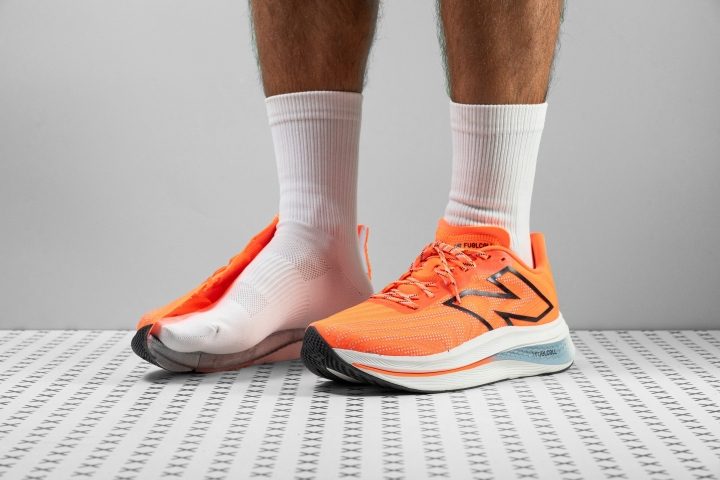Our verdict
- Our top pick in best marathon running shoes
Pros
- Incredibly plush midsole
- Effective rockered ride
- Ideal for long-distance training
- Significant weight reduction from the first version
- Rare wide-size availability for a supershoe
- Exceptionally durable outsole
- Surprisingly stable performance
- Compliant with World Athletics regulations
Cons
- The upper lacks breathability and durability
- Energy return falls short compared to other supershoes
- Noticeable discrepancy from the stated drop
Audience verdict
- Top 24% in New Balance running shoes
- Top 25% in winter running shoes
Comparison
The most similar running shoes compared
Who should buy
The New Balance FuelCell SuperComp Trainer v2 stands out in our lab as an excellent choice for:
- Marathoners looking for a race-day shoe that can double as a comfortable, roomy long run and speedwork companion.
- Anyone after a maximally cushioned, carbon-plated supertrainer for a rockered running experience.
- Enthusiasts of the supremely soft FuelCell foam looking for the pinnacle of a plush sensation.
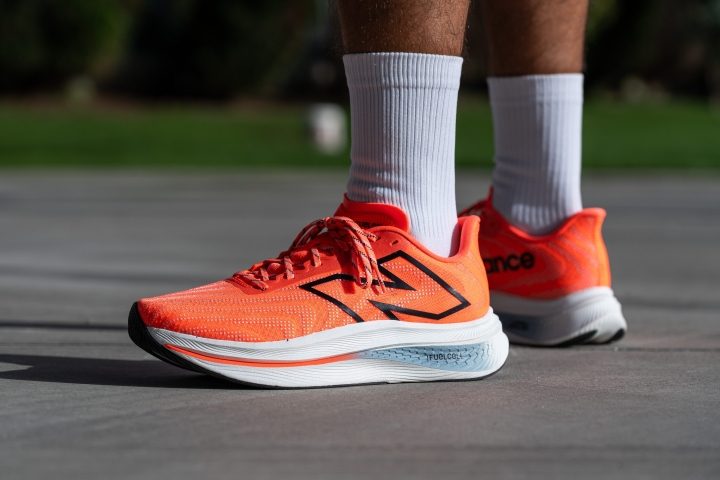
Who should NOT buy
For those chasing peak performance, the New Balance FuelCell SuperComp Trainer v2 might not be the top contender. While we found in the lab that it's lighter than its predecessor, it remains on the heavier side for race day.
Consider opting for the Nike Alphafly 2 instead, which offers a lighter build and superior foam technology for enhanced performance. We've found it to be a top choice for racers seeking cutting-edge technology.
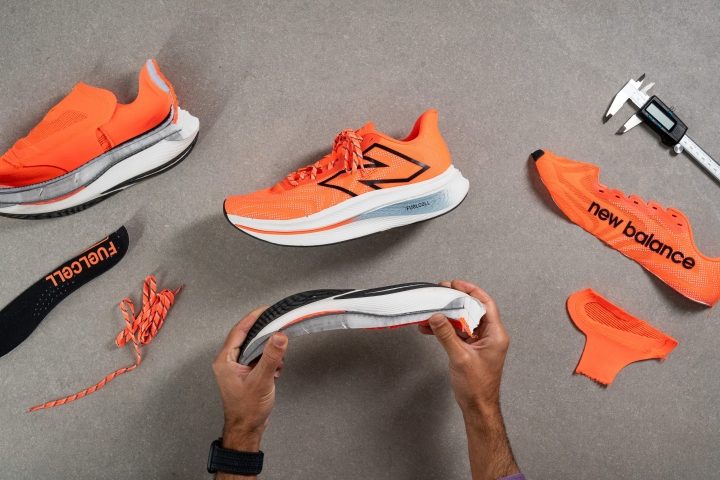
Additionally, it's not the ideal supershoe for those who prefer a balanced or firmer midsole. Runners with this taste would benefit more from top-tier options like the ASICS Metaspeed Sky+ or the Saucony Endorphin Elite.
Breathability
The 1st-gen SuperComp Trainer wowed us with its well-ventilated upper, leading us to expect New Balance would maintain this winning formula in version 2. Regrettably, this year's edition didn't live up to our expectations, scoring an average-at-best 3/5 in our lab tests.
Our light revealed the shoe's weakness in breathability around the midfoot, which was reinforced for stability at the cost of airflow.
A closer inspection under the microscope exposed a dense mesh devoid of any ventilation holes, explaining the 3/5 breathability.
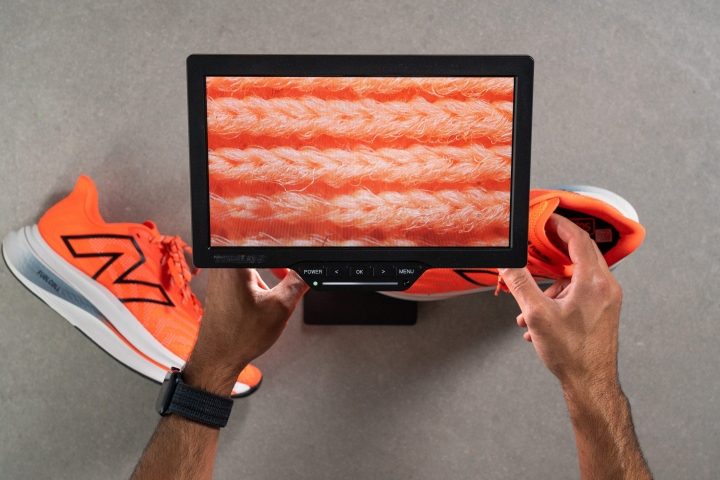
While the upper is indeed cozy, and the inclusion of an inner layer peppered with hundreds of perforations is a nice touch, the combination of a thick mesh and a lack of ventilation holes leads to a shoe that falls short for hot weather runs.
It's rare to find supershoes that offer such generous heel padding. Truly impressive!
| FuelCell SuperComp Trainer v2 | 3 |
| Average | 3.8 |
Durability
Toebox durability
The biggest letdown with the upper is that despite its only moderate breathability, we anticipated it would at least be somewhat durable.
Sadly, this wasn't the case—the New Balance SC Trainer v2 scored a disheartening 1 out of 5 on our Dremel durability test, proving not to be the best choice for those who wear out holes easily with their big toe or pinky toe.
| FuelCell SuperComp Trainer v2 | 1 |
| Average | 2.4 |
Heel padding durability
After the disappointing outcome of our previous Dremel test, we had low expectations for the heel padding's durability.
To our delight, the shoe exceeded our hopes, holding up exceptionally well and securing an impressive perfect score of 5 out of 5 despite being really padded!
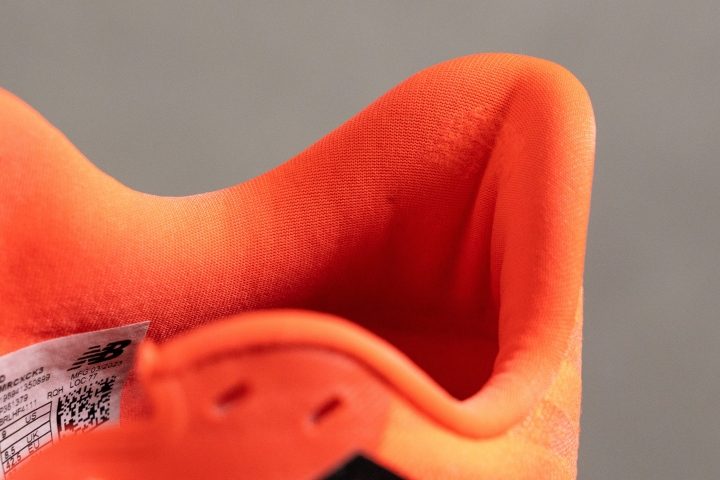
| FuelCell SuperComp Trainer v2 | 5 |
| Average | 3.1 |
Outsole hardness
The outsole features rubber at a 73.0 HC hardness, striking a unique balance for a supershoe—it's harder than what we typically see in racing shoes yet softer than the standard for daily trainers.
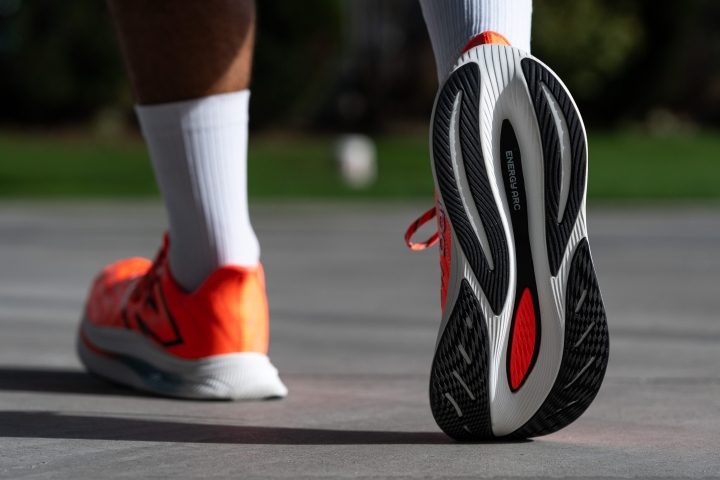
The outsole is packed with an impressive amount of rubber, hinting at superior durability. You can also see the "Energy ARC".
This dichotomy encapsulates the essence of this shoe: despite having "Trainer" in its name, it delivers a full experience akin to a high-end marathon racing shoe.
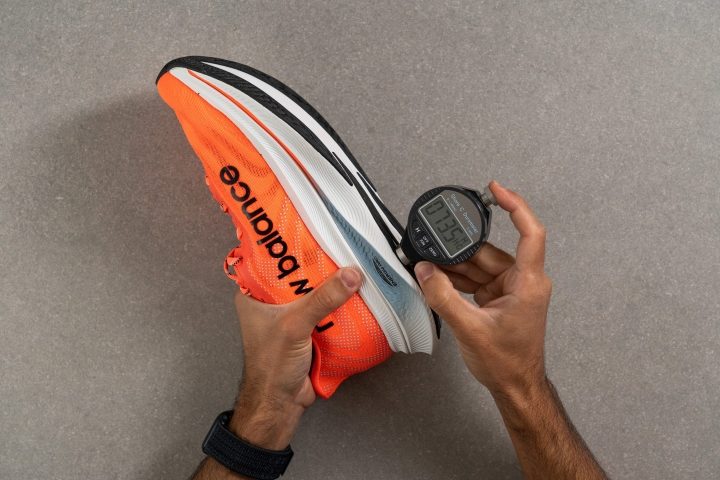
| FuelCell SuperComp Trainer v2 | 73.0 HC |
| Average | 80.2 HC |
Outsole durability
The outsole paints a promising picture, positioning this shoe as a solid pick for those chasing a high-end carbon-plated option with the bonus of durability. Now it's time to put it to the test.
In our standard dremel test that we apply to all running shoes, we noted just a tiny 0.7-mm indentation, which not only confirms the shoe's durability but also shows it outlasts most models on the market.
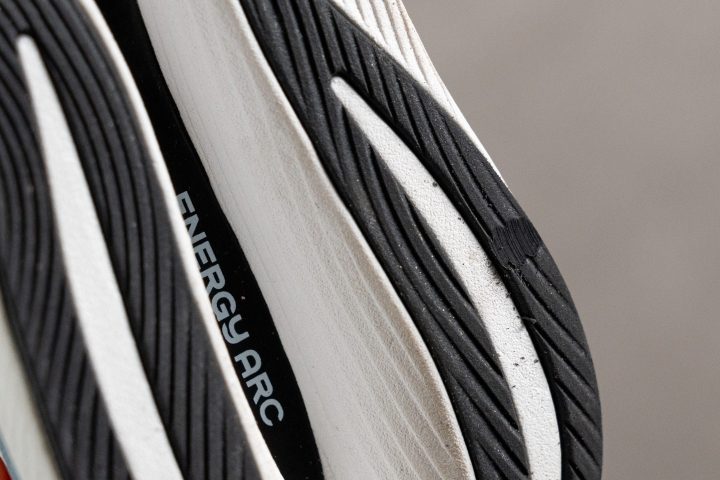
| FuelCell SuperComp Trainer v2 | 0.7 mm |
| Average | 0.9 mm |
Outsole thickness
New Balance didn't hold back on the rubber; at 2.8 mm, it's quite generous for this category of shoe, once more signaling excellent durability.
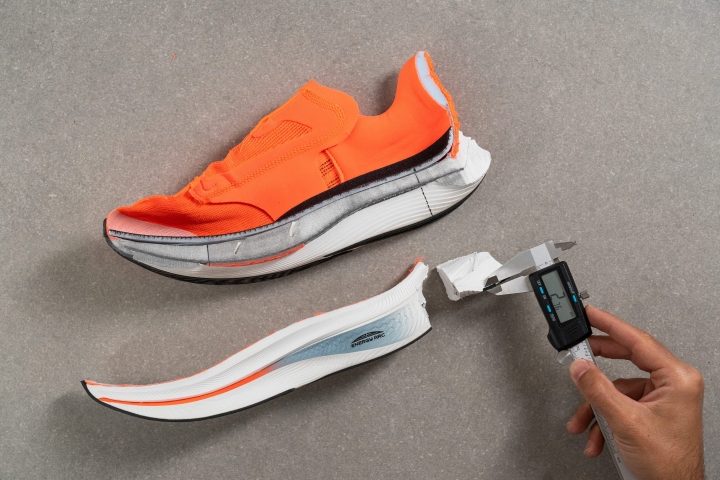
| FuelCell SuperComp Trainer v2 | 2.8 mm |
| Average | 3.2 mm |
Weight
The first generation SC Trainer was often criticized for its weight, tipping the scales at 10.5 oz or 298g, which was too hefty for a shoe meant for speed.
New Balance has responded to the feedback with the v2, which has undergone a significant weight reduction down to 9.3 oz or 264g. While it may not be the lightest among elite marathon shoes, it's an excellent weight for a shoe that offers both cushioning and a focus on tempo paces.
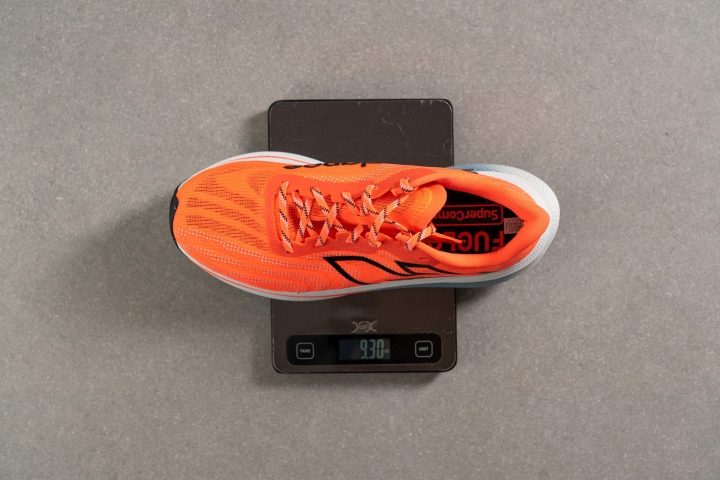
| FuelCell SuperComp Trainer v2 | 9.31 oz (264g) |
| Average | 9.35 oz (265g) |
Cushioning
Heel stack
At the World Athletics measurement points, we measured the heel stack height at 39.3 mm, confirming that it's within race-day legal limits, and indeed, it has been officially approved.
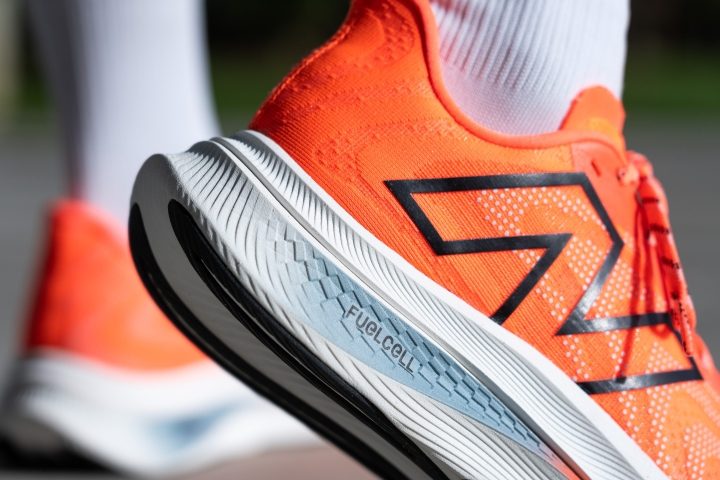
For those concerned about maximizing cushioning while still adhering to regulations—most runners should not worry about this at all—this shoe is one of your closest bets to the 40-mm threshold.
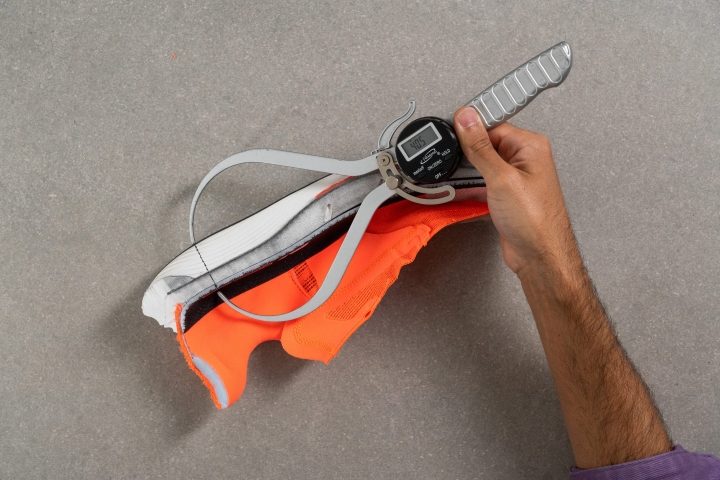
| FuelCell SuperComp Trainer v2 | 39.3 mm |
| Average | 33.6 mm |
Forefoot stack
The forefoot boasts a substantial 30.9-mm thickness, providing a significant stack height that caters well to both midfoot and forefoot strikers.
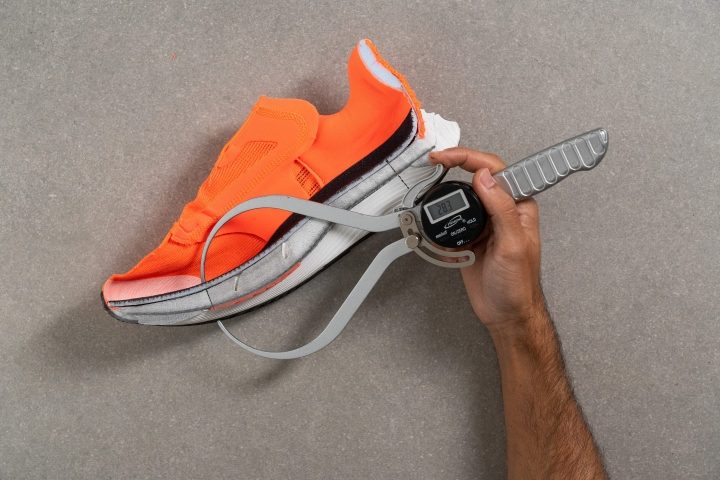
| FuelCell SuperComp Trainer v2 | 30.9 mm |
| Average | 24.9 mm |
Drop
By deducting the forefoot stack from the heel, we ended up with an 8.4-mm heel-to-toe drop. This measurement positions the shoe as a versatile all-rounder, suited for all footstrikes and proving itself as a reliable choice for long-distance runs.
It's worth noting, though, that New Balance advertises a 6-mm heel-to-toe drop, which doesn't align with our exact findings. For those curious about these discrepancies, rest assured, we have the explanations ready for you.
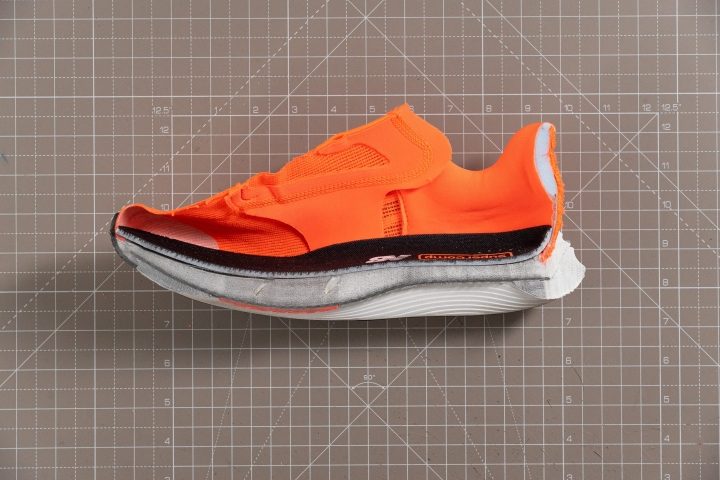
| FuelCell SuperComp Trainer v2 | 8.4 mm |
| Average | 8.7 mm |
Insole thickness
New Balance has opted for a slim 3.3-mm insole, clearly aiming to maximize foam use while keeping the shoe within the race-day legal height limit of 40 mm.
Essentially, we think that they've added the thickest outsole they could to hit that 40 mm mark.
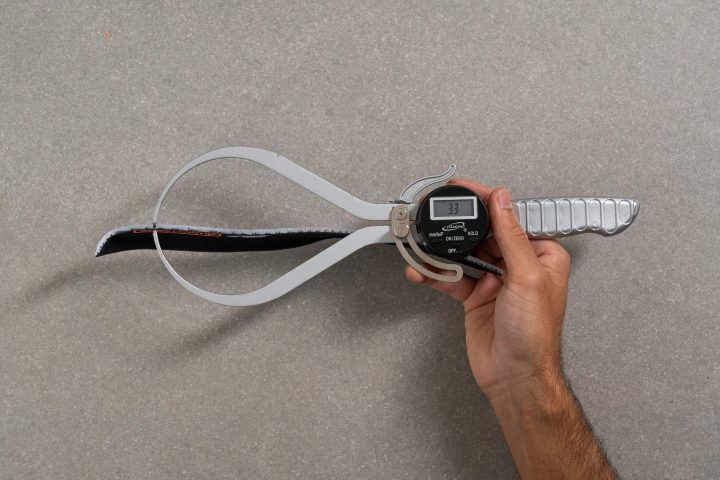
| FuelCell SuperComp Trainer v2 | 3.3 mm |
| Average | 4.4 mm |
Midsole softness
After lab-testing well over 200 running shoes, only a handful offer the plush, cloud-like foam that we found in the SuperComp Trainer v2. With a durometer reading of 9.6 HA, it provides an ultra-soft experience that's rare in the market.
However, there are some trade-offs. While softness sometimes feels luxurious, it doesn't always equate to superior performance or a better running experience.
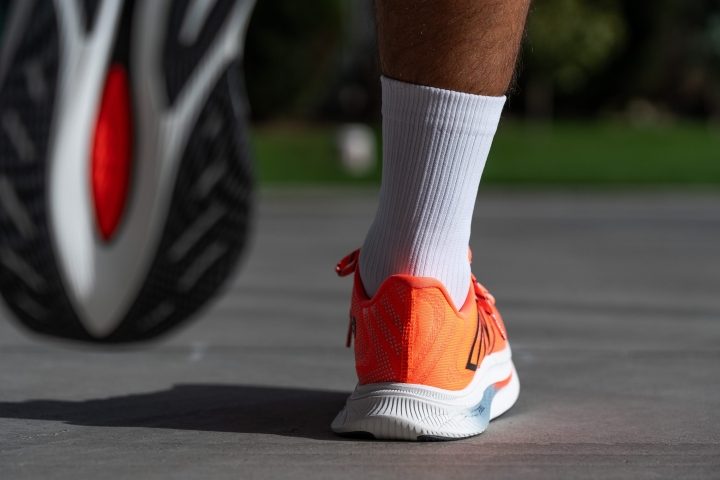
The shoe's stability is somewhat compromised, and the FuelCell foam tends to feel a bit too mushy, lacking the energy return seen in other supershoes.
In essence, if you're after a hyper-soft supertrainer, this one's for you. But if your preference leans towards a more balanced feel, you might want to look at the ASICS Superblast.
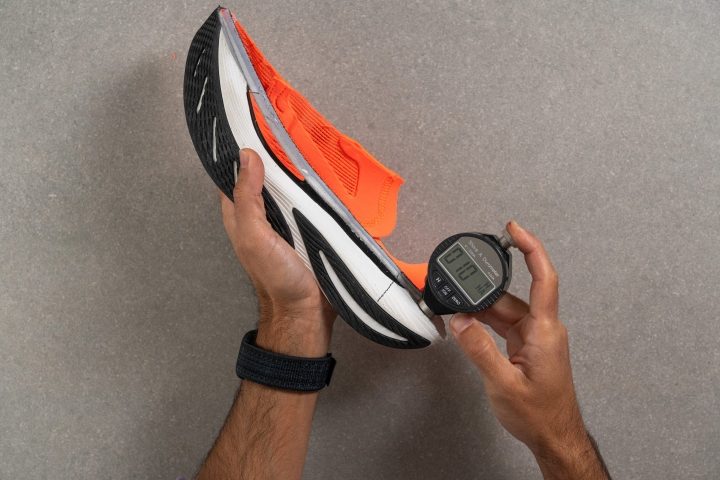
| FuelCell SuperComp Trainer v2 | 9.6 HA |
| Average | 21.3 HA |
Difference in midsole softness in cold
Following a 20-minute stint in the freezer, we re-tested it. This time, the result ticked up a notch to 13.0 HA. It remained soft, though noticeably less so.
A 35% increase in a supposed high-performance shoe is quite surprising, isn't it? The issue is that FuelCell isn't made of PEBAX or TPEE foam, materials known for their cold resistance. It's made of TPU+EVA, and we even included it among the "Standard foams" group in our bible about running shoe foams.
This stands as a big critique of New Balance. When setting a premium price, consumers expect premium performance in every aspect of the shoe, but sadly, that's not what we're seeing here.
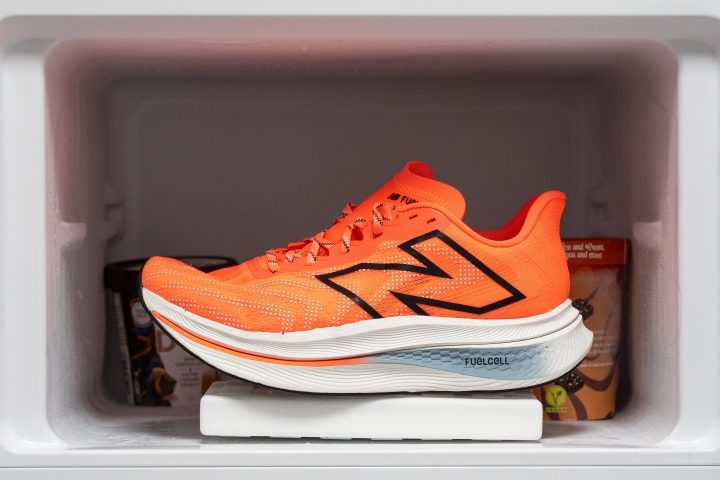
| FuelCell SuperComp Trainer v2 | 35% |
| Average | 25.8% |
Stability
Lateral stability test
An ultra-cushioned midsole crafted from super-soft foam always leads to an unstable ride, generally recommended only for runners with flawless neutral mechanics.
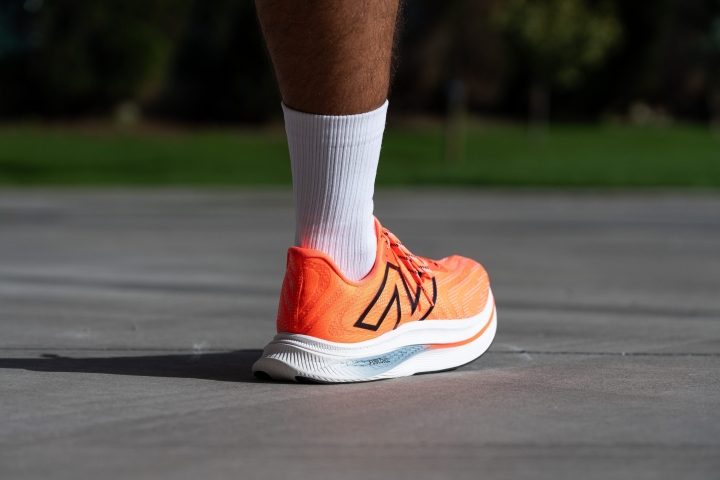
New Balance has indeed enhanced the stability in the second version, employing clever tweaks such as a reinforced upper.
However, we must note that it's not the ideal pick for those seeking a supportive ride. Even mild pronators might find better stability in race-ready alternatives like the Adidas Adizero Adios Pro 3.
Torsional rigidity
With a full-length carbon plate nestled within the midsole, we knew that this shoe was getting a torsional rigidity score of 5/5. The video clearly shows the struggle we had trying to bend and twist it.
| FuelCell SuperComp Trainer v2 | 5 |
| Average | 3.2 |
Heel counter stiffness
Aware of New Balance's efforts to maximize stability, we were quite surprised to encounter just an average heel counter, which we rated at 3/5.
While we wouldn't necessarily advocate for a firmer counter that could compromise comfort, a more stiff design won't be a surprise for the v3.
| FuelCell SuperComp Trainer v2 | 3 |
| Average | 2.8 |
Midsole width in the forefoot
Stability is key in this type of shoes, and when we turn to the midsole width, it's essential for maximalist footwear to have a broader-than-average base.
New Balance understood the assignment, crafting the shoe with a midsole width of 115.6 mm, which offers a solid landing platform.
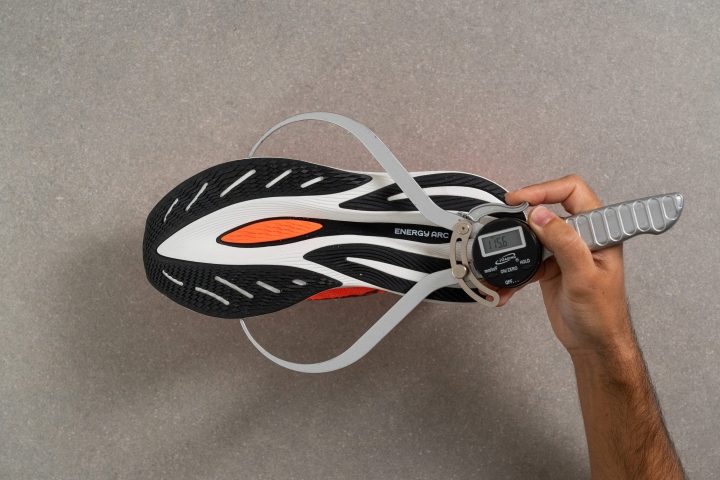
| FuelCell SuperComp Trainer v2 | 115.6 mm |
| Average | 113.6 mm |
Midsole width in the heel
With a high heel-to-toe drop that caters to rearfoot strikers, a wide heel is essential.
So kudos to New Balance's design team for getting it right—we measured the heel at a generous 95.6 mm, taking a wide stance that enhances stability.
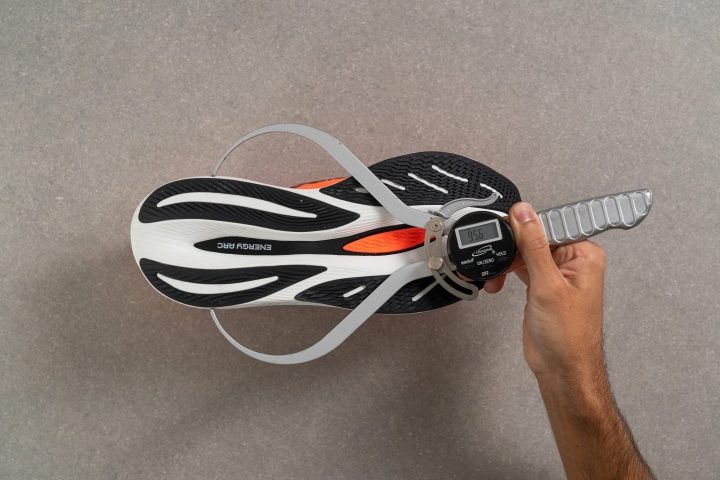
| FuelCell SuperComp Trainer v2 | 95.6 mm |
| Average | 90.4 mm |
Rocker
The OG SC Trainer set the benchmark in our comparisons for rocker technology, earning a spotlight in our guide on the subject. So we were keen to discover if New Balance maintained this geometry in this version.
Indeed, we found that they have preserved the rocker design. Our tests and running experience confirm a rockered ride that smoothly facilitates forward momentum, and to a certain degree, it counteracts the potential for sinking into the buttery-soft FuelCell foam.
Flexibility
Stiffness
We found this to be one of the more flexible carbon plates we've tested, likely due to New Balance's Energy Arc design. It only required 35.4N from us to bend it to 90 degrees!
The Energy Arc, a unique concept from New Balance, merges a full-length carbon fiber plate with a significant void that extends from under the heel to the beginning of the forefoot in the center of the shoe.
| FuelCell SuperComp Trainer v2 | 35.4N |
| Average | 29.4N |
Difference in stiffness in cold
Following a second 20-minute siesta in the freezer, we ran the test once more and recorded a result that was similar: 40.2N.
With just a 13.6% increase, the SC Trainer v2 delivers a robust result, aligning perfectly with our expectations for this shoe.
| FuelCell SuperComp Trainer v2 | 13.6% |
| Average | 37% |
Size and fit
Toebox width at the widest part
Supershoes often have a snug toebox, yet with a maximum width of 98.2 mm, the Trainer v2 is surprisingly roomy.
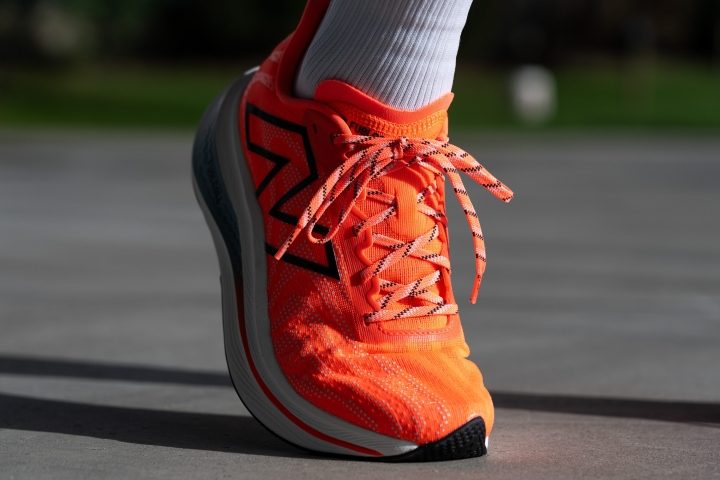
This spaciousness hints once more that the shoe isn't meant exclusively for racing—it's also crafted for 20-milers and intense tempo runs.
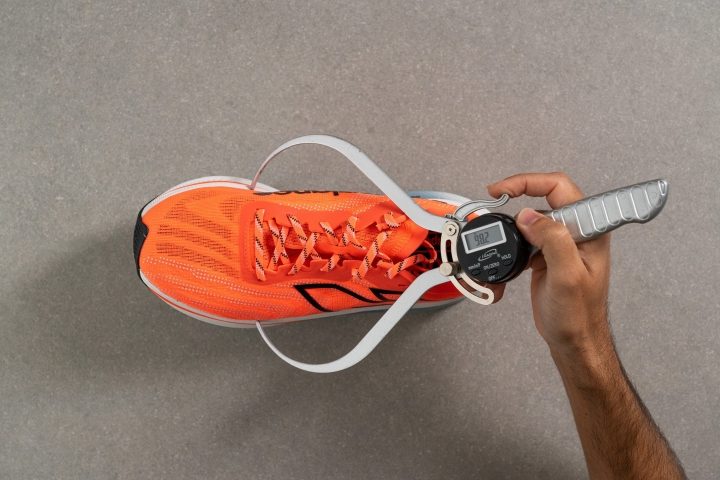
| FuelCell SuperComp Trainer v2 | 98.2 mm |
| Average | 98.3 mm |
Toebox width at the big toe
The big toe area is comfortably standard at 77.6 mm, fitting a wide range of foot shapes.
But there's a delightful twist with this shoe—it's one of the select few supershoes that come in a wide size option, a feature that's bound to be a pleasant surprise for those with wide feet.
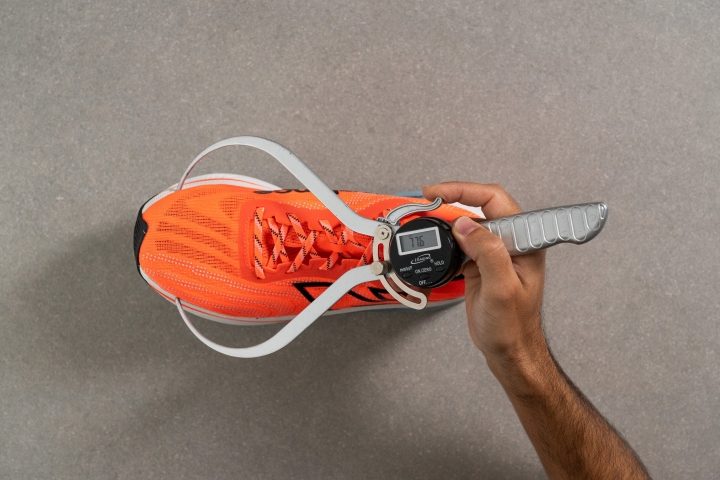
| FuelCell SuperComp Trainer v2 | 77.6 mm |
| Average | 78.0 mm |
Tongue: gusset type
The tongue features a semi-gusseted design, which is welcome news.
Yes, the laces seem to be just a bit on the longer side.
During our tempo runs and even when pushing the pace with faster strides, the tongue stayed perfectly in place.
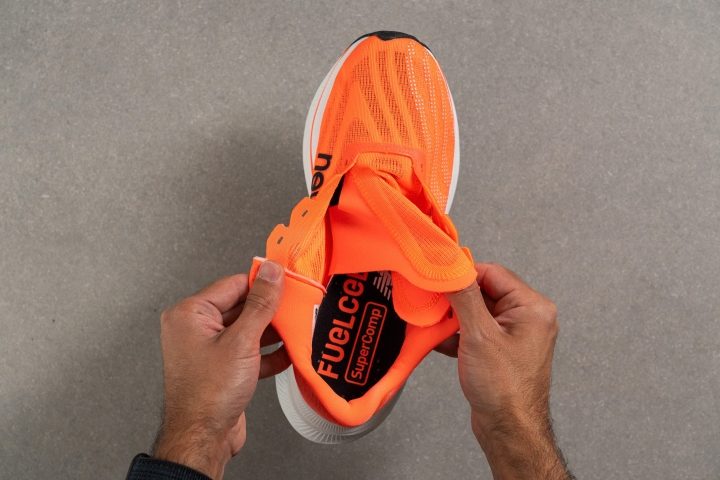
| FuelCell SuperComp Trainer v2 | Both sides (semi) |
Comfort
Tongue padding
At 2.6 mm, the tongue strikes a well-rounded balance between racing flats and training models.
While 2.6 mm might appear too thin for some, it feels quite plush compared to the fastest shoes on the market, which typically feature tongues less than 1 mm thick.
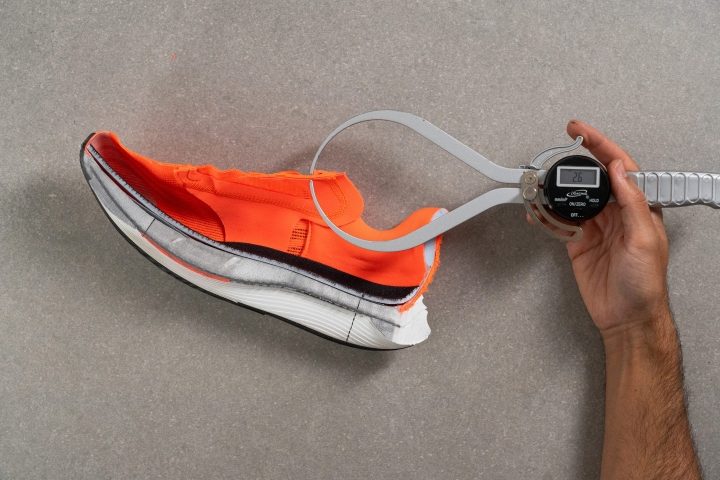
| FuelCell SuperComp Trainer v2 | 2.6 mm |
| Average | 5.6 mm |
Heel tab
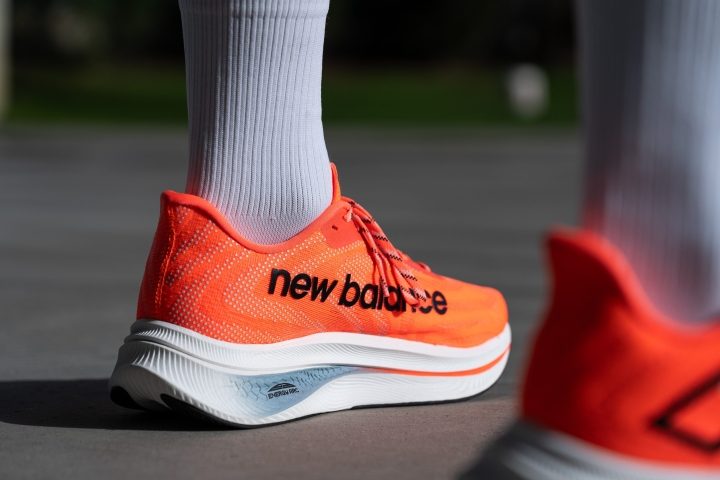
Removable insole
The removable insole of the New Balance FuelCell SuperComp Trainer v2 allowed us to put in insoles from other running shoes and custom orthotics without any problems.
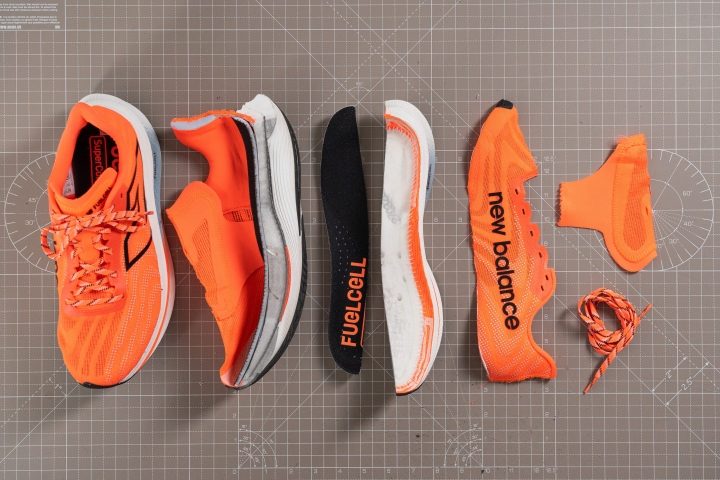
| FuelCell SuperComp Trainer v2 | Yes |
Misc
Reflective elements
Unfortunately, the SC Trainer v2 has zero reflective elements.
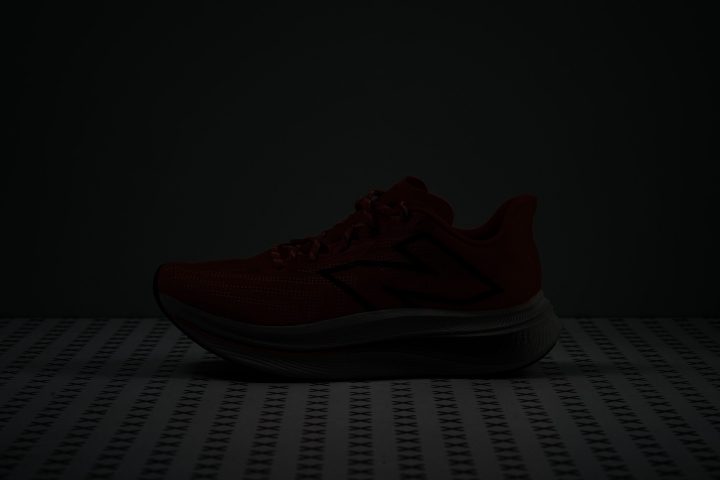
| FuelCell SuperComp Trainer v2 | No |

